Course Overview
About the programme:
MIG welding, which stands for Metal Inert Gas welding, is a popular and versatile welding process commonly used in various industries. A MIG welding course can benefit individuals looking to acquire or enhance their welding skills.
Programme Outcome:
- Introduction to Welding: The course typically starts with an introduction to welding as a whole, covering the basic principles and safety considerations associated with welding processes.
- Overview of MIG Welding: Students will learn about the specific characteristics and advantages of MIG welding. This includes understanding the equipment involved, such as the welding machine, gas supply, and consumables like electrodes and filler wires.
- Safety Protocols: Safety is a paramount concern in welding. The course will cover safety procedures, including the use of Personal Protective Equipment (PPE), proper ventilation, and safe work practices.
- Equipment Setup: Students will learn how to set up and operate MIG welding equipment. This involves understanding the different components of the welding machine, adjusting settings, and ensuring proper gas flow.
- Metal Preparation: Proper preparation of metals before welding is crucial for achieving strong and durable welds. Students will be taught about cleaning, bevelling, and other preparation techniques for various materials.
- Welding Techniques: The course will cover fundamental welding techniques, including joint types, positions, and the correct movement of the welding torch. Students will practise creating different types of welds on various materials.
- Troubleshooting and Problem-Solving: As welding can be complex, the course addresses common issues and challenges that welders encounter. This includes troubleshooting problems with the welding equipment, addressing weld defects, and ensuring quality welds.
- Quality Control and Inspection: Understanding how to inspect and assess the quality of welds is essential. The course may cover visual inspection, as well as the use of non-destructive testing methods to ensure weld integrity.
- Practical Hands-On Training: A significant portion of the course will involve hands-on practical training. Students will have the opportunity to apply the theoretical knowledge gained in a controlled workshop environment under the guidance of experienced instructors.
- Certification: Some courses may offer a certification upon completion. This certification can be valuable for those seeking employment in welding-related fields, as it demonstrates a certain level of proficiency in MIG welding.
Overall, a MIG welding course aims to equip participants with the knowledge and skills needed to perform MIG welding safely and effectively. It provides a foundation for individuals pursuing careers in welding or those looking to enhance their existing skills for personal or professional development.
View MoreThe given Training Bodies will be the Course Venues. You can reach out to one of our representatives from the following training bodies for more details.
Little Flower Engineering Institute Kalamassery, Ernakulam
Little Flower Engineering Institute, NH – 544, Cochin University P.O., South Kalamassery, Kochi
https://littleflower.ac.in/CONTACT DETAILS
Little Flower Engineering Institute Kalamassery, Ernakulam
+91-484-254120
littleflowerengg@gmail.com



